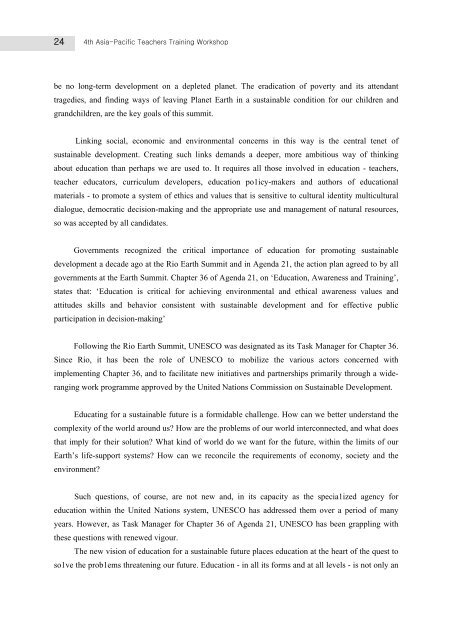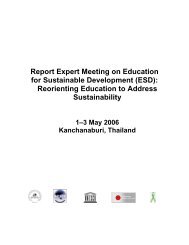INTRODUCTION & PROGRAMME - APCEIU
INTRODUCTION & PROGRAMME - APCEIU
INTRODUCTION & PROGRAMME - APCEIU
- No tags were found...
You also want an ePaper? Increase the reach of your titles
YUMPU automatically turns print PDFs into web optimized ePapers that Google loves.
244th Asia-Pacific Teachers Training Workshopbe no long-term development on a depleted planet. The eradication of poverty and its attendanttragedies, and finding ways of leaving Planet Earth in a sustainable condition for our children andgrandchildren, are the key goals of this summit.Linking social, economic and environmental concerns in this way is the central tenet ofsustainable development. Creating such links demands a deeper, more ambitious way of thinkingabout education than perhaps we are used to. It requires all those involved in education - teachers,teacher educators, curriculum developers, education po1icy-makers and authors of educationalmaterials - to promote a system of ethics and values that is sensitive to cultural identity multiculturaldialogue, democratic decision-making and the appropriate use and management of natural resources,so was accepted by all candidates.Governments recognized the critical importance of education for promoting sustainabledevelopment a decade ago at the Rio Earth Summit and in Agenda 21, the action plan agreed to by allgovernments at the Earth Summit. Chapter 36 of Agenda 21, on ‘Education, Awareness and Training’,states that: ‘Education is critical for achieving environmental and ethical awareness values andattitudes skills and behavior consistent with sustainable development and for effective publicparticipation in decision-making’Following the Rio Earth Summit, UNESCO was designated as its Task Manager for Chapter 36.Since Rio, it has been the role of UNESCO to mobilize the various actors concerned withimplementing Chapter 36, and to facilitate new initiatives and partnerships primarily through a widerangingwork programme approved by the United Nations Commission on Sustainable Development.Educating for a sustainable future is a formidable challenge. How can we better understand thecomplexity of the world around us? How are the problems of our world interconnected, and what doesthat imply for their solution? What kind of world do we want for the future, within the limits of ourEarth’s life-support systems? How can we reconcile the requirements of economy, society and theenvironment?Such questions, of course, are not new and, in its capacity as the specia1ized agency foreducation within the United Nations system, UNESCO has addressed them over a period of manyyears. However, as Task Manager for Chapter 36 of Agenda 21, UNESCO has been grappling withthese questions with renewed vigour.The new vision of education for a sustainable future places education at the heart of the quest toso1ve the prob1ems threatening our future. Education - in all its forms and at all levels - is not only an








